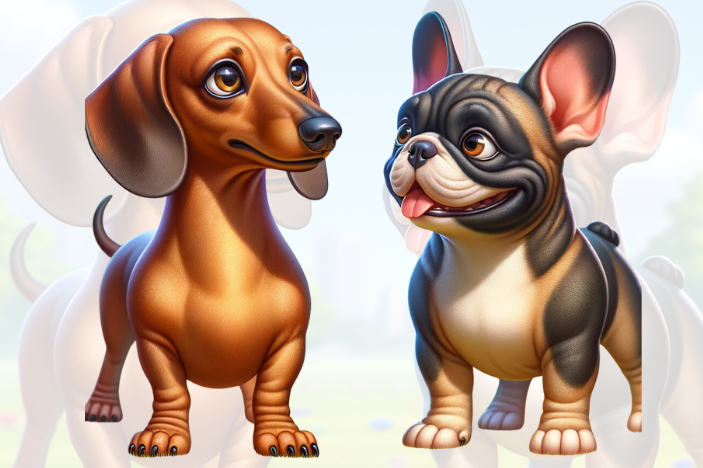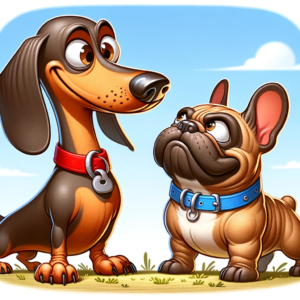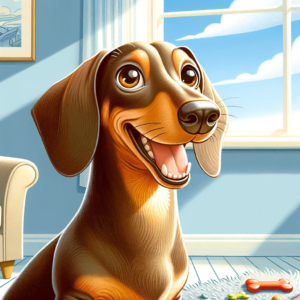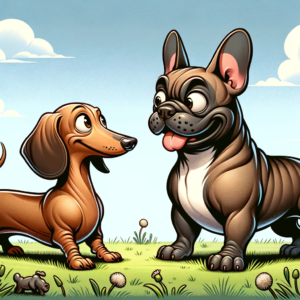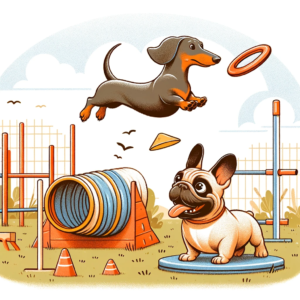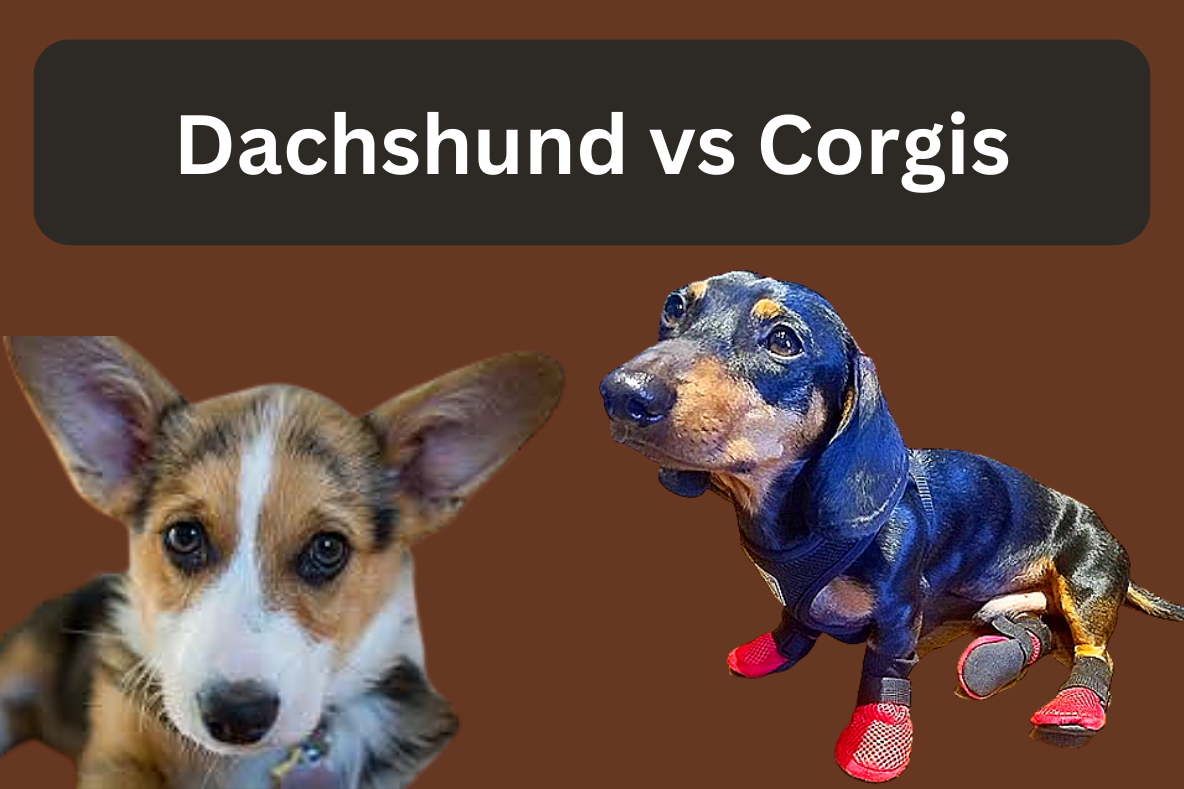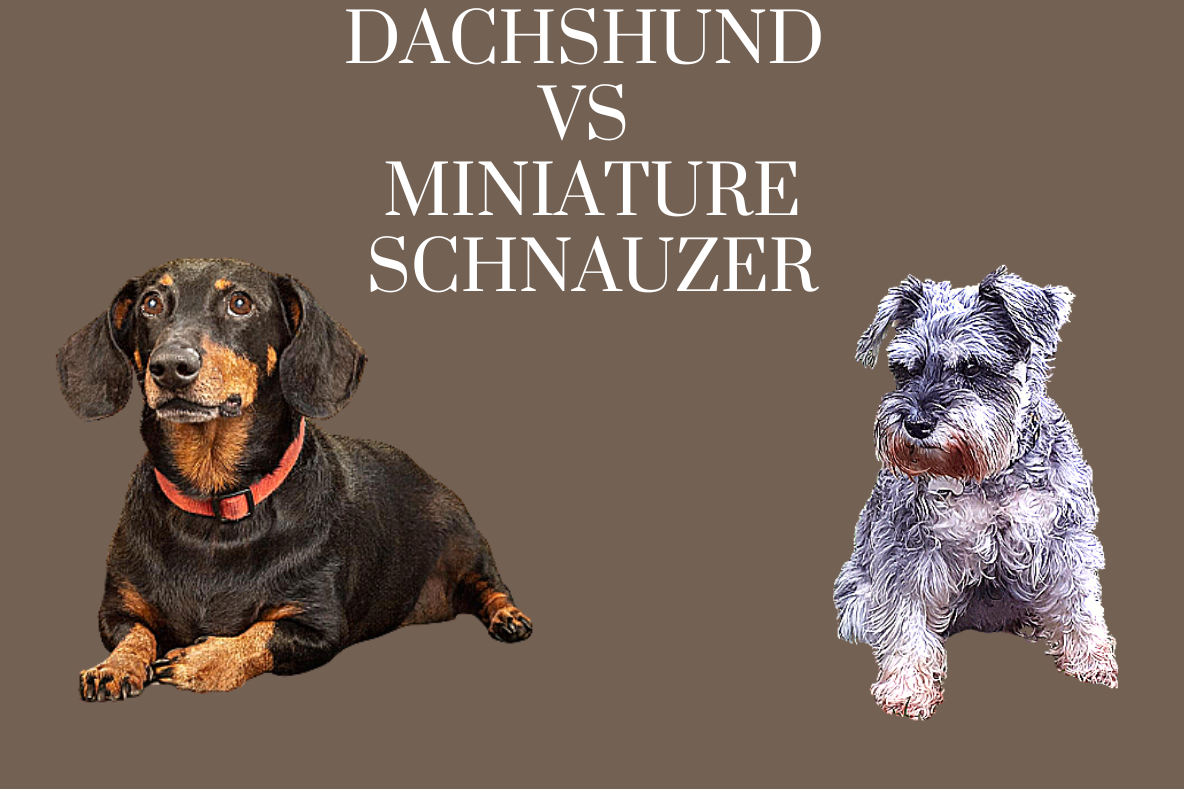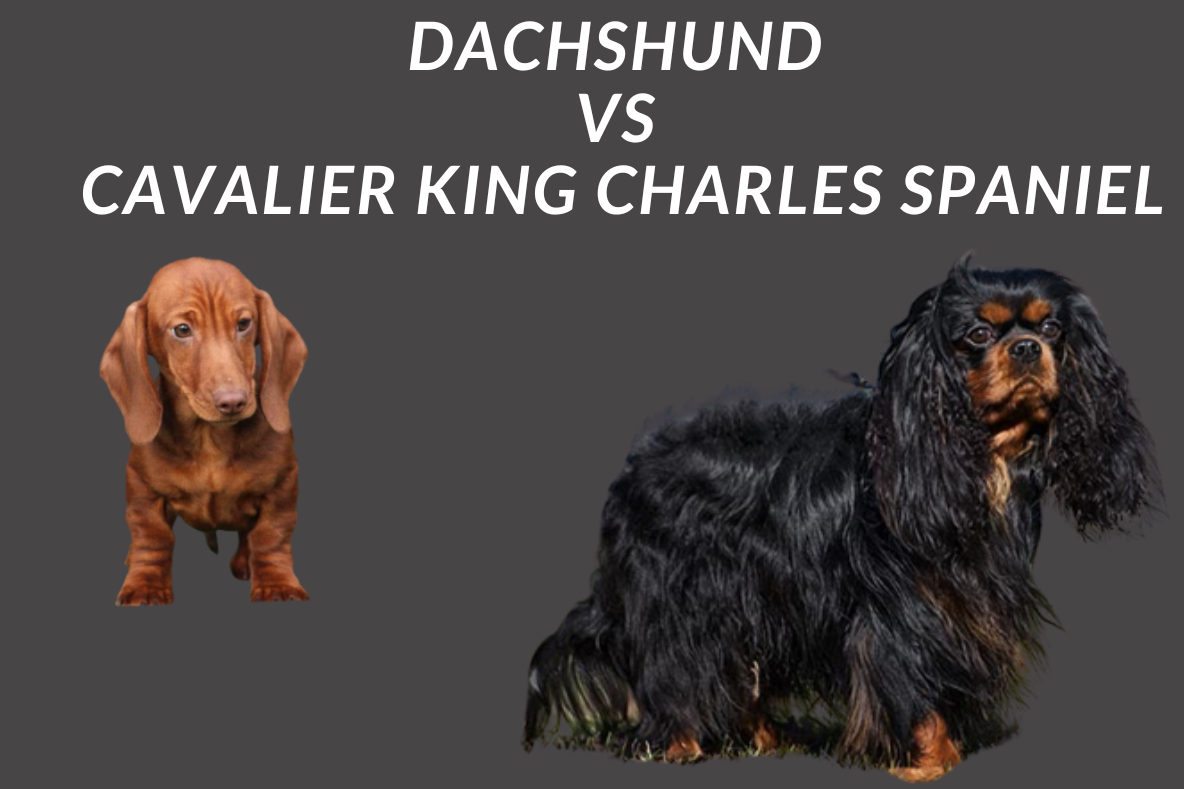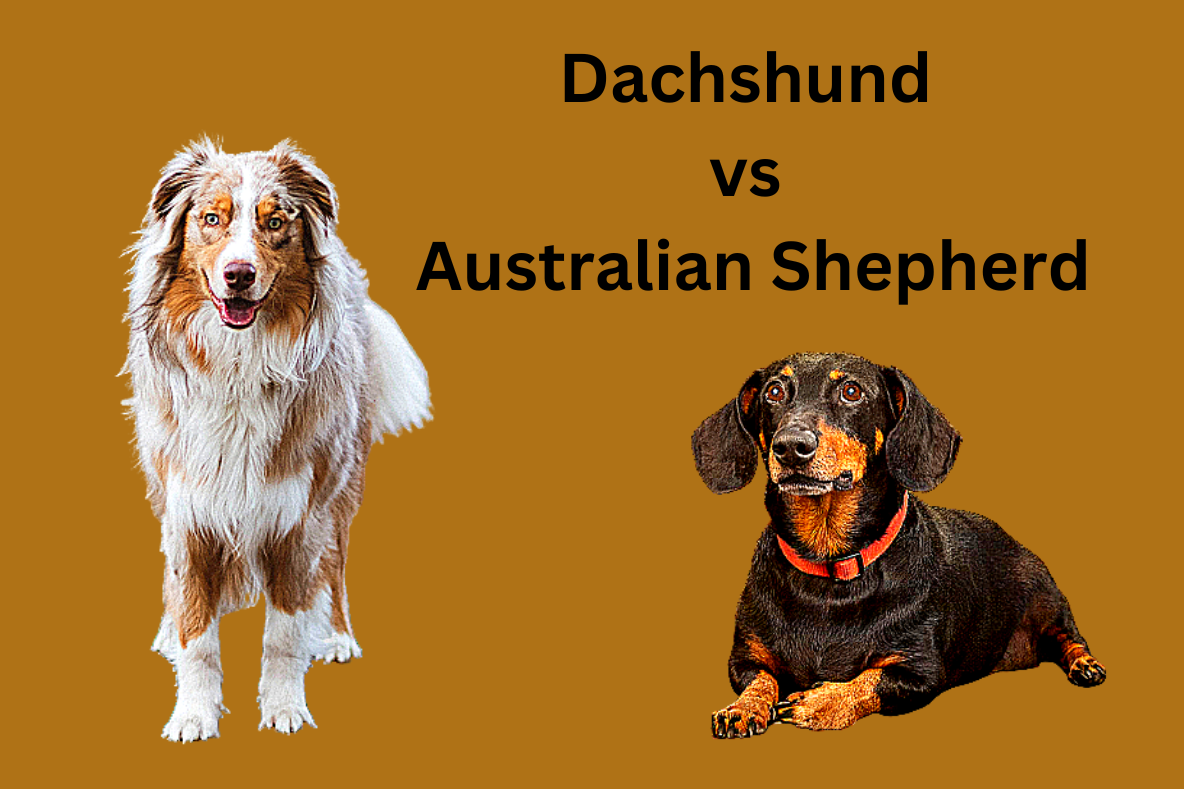Dachshunds
Dachshunds are long, low dogs bred to hunt badgers and other small prey. With their elongated bodies, short legs, and muscular frames, they are built for digging into burrows and tunnels. Dachshunds have deep chests, narrow skulls, and sturdy front legs. They come in three coat varieties – smooth, long-haired, and wire-haired. Dachshunds are energetic, brave, and independent dogs known for their spirit and vermin-hunting skills.
French Bulldogs
French Bulldogs have a powerfully built, muscular body and a squashed face. Their large, square head features prominent eyes and the bat-like ears characteristic of the breed. Their smooth, short coat comes in a range of colors like brindle, fawn, and pied.
French Bulldogs are playful, charming lapdogs. Though they require little exercise, they have great energy in short bursts. They are affectionate, loyal, and eager to please their owners. They make excellent companion dogs.
In summary, Dachshunds are long, energetic hunters while French Bulldogs are short, charming lapdogs. Dachshunds need frequent exercise while French Bulldogs prefer short walks. Both breeds bond closely with their owners and make lively, devoted companions when provided proper care suited to their distinct personalities and needs.
Dachshund Vs French Bulldog Comparison
Certainly! Here’s a table comparing Dachshunds and French Bulldogs across various aspects:
| Aspect | Dachshund | French Bulldog |
|---|---|---|
| Weight | Miniature: 9-11 lbs, Standard: 16-32 lbs | 16-28 lbs |
| Height | Miniature: 5-6 inches, Standard: 8-9 inches | 11-12 inches |
| Group | Hound | Non-Sporting |
| Popularity Rank | 12th | 4th |
| Reviews | Generally positive | Generally positive |
| User Ratings | 4.5/5 | 4/5 |
| Breed Type | Purebred | Purebred |
| Price Range | $800-$2,500 | $1,500-$4,000 |
| Availability | Readily available | Readily available |
| Coat/Hair Types | Smooth, longhaired, wirehaired | Short, smooth |
| Color | Various (e.g., black, red, dapple) | Various (e.g., fawn, brindle, pied) |
| Grooming | Moderate grooming required | Low grooming required |
| Shedding Level | Low | Low to moderate |
| Bath Time/Bathing Frequency | As needed | As needed |
| Intelligent Rank | Average to high | Average to high |
| Trainability | Moderately trainable | Moderately trainable |
| Sensitivity Level | Moderately sensitive | Moderately sensitive |
| Affection Level | High | High |
| Social Needs | Moderate | Moderate |
| Barking | Moderate to high | Low to moderate |
| Watchdog Ability | Moderate | High |
| Guarding Behavior/Territorial | Moderate to high | Low to moderate |
| Biting Potential | Moderate | Low |
| Mouthiness | Moderate | Low |
| The impulse to Wander/Roam | Moderate to high | Low |
| Apartment Friendly | Yes | Yes |
| Adaptability | Good | Good |
It’s always important to research and understand the unique needs of each breed before making a decision to bring a dog into your home.
Size and Appearance Dachshund Vs French Bulldog
Dachshund: The Dachshund, also known as the “wiener dog” or “sausage dog,” is a small to medium-sized breed. They have a long, low-slung body with short legs and a distinctive elongated shape. Dachshunds come in three coat varieties: smooth, wirehaired, and longhaired, and they exhibit various colors and patterns.
French Bulldog: The French Bulldog, or “Frenchie,” is a small-sized breed with a sturdy and muscular build. They have a compact frame, a broad chest, and a distinctive pushed-in nose.
French Bulldogs have a short, smooth coat, which can appear in a variety of colors, including brindle, fawn, white, and pied.
Dachshund Vs French Bulldog Temperament and Personality
Dachshund: Dachshunds are known for their unique and spirited personality. They are often described as courageous, curious, and independent. Despite their small size, they possess a confident and sometimes stubborn nature.
Dachshunds are generally friendly and affectionate towards their owners, but they can be wary of strangers. Due to their hunting background, they may display a strong prey drive and may not be suitable for households with small pets.
French Bulldog: French Bulldogs are renowned for their affectionate and sociable nature. They are known to be excellent companions and thrive on human interaction.
Frenchies are generally friendly, and playful, and love to be the center of attention. They have a calm demeanor and are well-suited for apartment living. French Bulldogs typically get along well with other animals and children, making them a great choice for families.
Exercise and Training
Dachshund: Despite their small stature, Dachshunds are energetic and require regular exercise to prevent obesity and maintain their overall health. They enjoy daily walks, interactive play sessions, and mental stimulation.
Dachshunds can be stubborn at times, so consistent and patient training methods are necessary. Early socialization is crucial to ensure they develop good behavior and get along well with other dogs.
French Bulldog: French Bulldogs are not excessively active dogs and have moderate exercise needs. They benefit from daily walks and engaging playtime sessions but are prone to overheating due to their brachycephalic (short-nosed) structure.
Therefore, exercise should be adjusted accordingly, especially in hot weather. Frenchies respond well to positive reinforcement-based training methods, as they are eager to please their owners.
Dachshund vs French Bulldog Health and Grooming
Dachshund: Dachshunds are generally a healthy breed, but they are prone to certain health issues such as intervertebral disc disease, which can cause back problems due to their long spine.
They may also experience obesity-related problems, dental issues, and patellar luxation. Grooming needs vary depending on the coat type but generally require regular brushing to prevent matting.
French Bulldog: French Bulldogs are prone to several health concerns, primarily associated with their brachycephalic structure.
They may suffer from breathing difficulties, overheating, eye problems, and skin allergies. Due to their short coat, grooming requirements are minimal, but regular cleaning of facial wrinkles and ears is necessary.
Dachshund vs French Bulldog Lifespan and Availability
Dachshund: Dachshunds have an average lifespan of 12 to 16 years. They are a popular breed and can be found in many countries around the world. They are readily available from reputable breeders, rescue organizations, and shelters.
French Bulldog: French Bulldogs have an average lifespan of 10 to 12 years. They are also a popular breed and can be found in many parts of the world.
However, their popularity has led to increased demand, which unfortunately has resulted in some unethical breeding practices.
It is crucial to find a reputable breeder who prioritizes the health and well-being of their dogs. Additionally, rescue organizations and shelters often have French Bulldogs available for adoption.
What is the difference in size between a Dachshund and a French Bulldog?
Dachshunds are typically longer and more elongated, with a body length ranging from 8 to 32 inches (20 to 81 cm) and a weight between 16 and 32 pounds (7 to 15 kg).
French Bulldogs, on the other hand, are smaller and more compact, measuring about 11 to 12 inches (28 to 30 cm) in height and weighing around 16 to 28 pounds (7 to 13 kg).
Are Dachshunds and French Bulldogs good with children?
Both Dachshunds and French Bulldogs can be great companions for children. However, Dachshunds tend to have a more independent and sometimes stubborn nature, while French Bulldogs are known for their friendly and affectionate demeanor. Proper socialization and supervision are always important when introducing any dog to children.
Do Dachshunds and French Bulldogs have similar exercise needs?
While Dachshunds and French Bulldogs both require regular exercise, their activity levels differ. Dachshunds have moderate exercise needs and enjoy daily walks and playtime.
French Bulldogs, being a brachycephalic breed (short-nosed), have more limited exercise tolerance and should avoid excessive heat and strenuous activities. Short walks and gentle play sessions are generally sufficient for French Bulldogs.
How do Dachshunds and French Bulldogs differ in terms of grooming requirements?
Dachshunds have a short, smooth coat or a longer wire-haired coat, and they shed moderately. Regular brushing to remove loose hair is usually enough to keep their coat healthy.
French Bulldogs have a short, smooth coat that sheds minimally. They require occasional brushing to control shedding and to keep their coat clean. Both breeds benefit from routine nail trimming, dental care, and ear cleaning.
Which breed is more prone to certain health issues, Dachshunds or French Bulldogs?
Both Dachshunds and French Bulldogs are prone to specific health conditions. Dachshunds are known to be susceptible to intervertebral disc disease due to their long backs. They may also be prone to certain eye problems and obesity.
French Bulldogs, being brachycephalic, can experience breathing difficulties and are more susceptible to heat exhaustion. They may also be prone to skin allergies and spinal disorders. Regular veterinary care and a healthy lifestyle can help minimize the risks associated with these health issues in both breeds.
Conclusion
Dachshunds Vs French Bulldogs have some similarities but also key differences that potential owners should consider. Both breeds are small, have short coats, and make good companion dogs. However, Dachshunds were originally bred to hunt while French Bulldogs were bred to be lapdogs.
As a result, Dachshunds typically have more energy and require more exercise than the more sedentary French Bulldog. Dachshunds also tend to be more independent and stubborn, while French Bulldogs aim to please their owners. Additionally, Dachshunds are prone to back problems while French Bulldogs are more likely to have respiratory issues.
When choosing between these two breeds, consider your lifestyle and needs.
